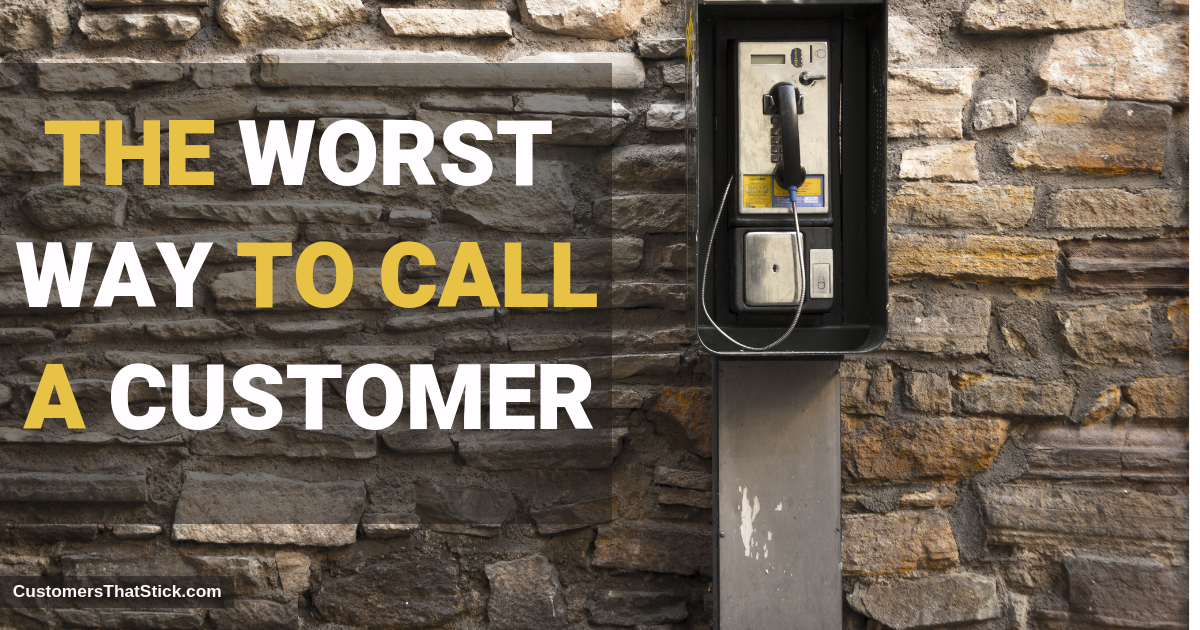
A well placed call to a customer can be one of the most valuable forms of communication in today’s business environment. When you make a sincere, customer-focused outbound call, you are using one of the most impactful forms of high touch interaction in the customer-facing professionals’ toolbox.
Yet, there is a right way to call, a wrong way to call, and the worst way to call a customer.
My wife and I had an experience recently that perfectly demonstrates how not to call a customer.
It was December 31st, a day on which many people are checked out for the holidays. Sure, many people are working that day, but outside of retail, food service, and a few specific industries, it’s a light day.
Most companies are not fully staffed that final week of the year, and most individuals are preparing for New Year’s Eve and the holiday that follows. If not physically, then at least mentally.
When our house phone rang on December 31st, my wife took the call. As I entered the room, I heard her say, “No thank you. We’ll just stick to the normal schedule.” Then she said goodbye and hung up the phone.
I could tell it had not been a positive call, so I asked her what it was about.
An agent from our local insurance agency had called to ask us if we wanted to accelerate the payment on our policy, to pay it early. The account is on auto-payment, so it is set up to charge automatically on a schedule and was scheduled to run a few weeks later in January.
Yet, this agent literally called us at home, interrupted our day, to ask if we wanted to pay right then. I should note that this was for a personal account, so there was no business or tax benefit to paying early.
After my wife described the call to me, she asked, “Why on earth would she do that?”
I knew immediately. “She’s trying to make her numbers for the year.”
This was truly a terrible customer experience, because it was all about the company and the agent, not the customer. Worse, it interrupted a customer who was not expecting to be contacted.
There are times when it is okay to contact a client for something you need. We use the term customer relationships, because they truly are (or should be) relationships. They are not one way, but — and this is key — they are also not equal.
Our primary job is to serve the customer, and it is our responsibility to time our customer communication well.
Our primary job is to serve the customer, and it is our responsibility to time our communication well.
With that said, we can certainly ask our customers to honor the relationship in different ways, whether this be a testimonial, a referral, or something else that is expected and usual. However, when we make a request of a customer or client, it should either fit the depth of the relationship or the recency of the interaction.
When you have a weak relationship with a customer and call out of the blue for something you need, particularly when there is no current context for the request, it sends a terrible message.
In customer service, we often talk about the power of first impressions and the impact of last interactions (recency effect). Since it had been so long since our last contact with our insurance agent, the call we received from our insurance agent on December 31st created both a poor new impression and left us with a bad experiential memory.
Until we have a different, more powerful experience to replace it, this experience will likely be what come to mind when we think of our insurance agent.
When you call a customer, it doesn’t always have to be about them, but if it’s about you, the relationship or the timing needs to have set the stage for the request, because calling a customer out of the blue for your own benefit is truly the worst way to call a customer.
Comments are closed.
© 2011-2025 CTS Service Solutions, LLC.
All rights reserved.
Legal Information | Privacy Policy
How to Cite this Site
Wow, your insurance agent was pretty brazen! I wonder how your wife would feel about the call if your agent offered something of value to you in exchange for the early payment?
Thanks for commenting! That’s an interesting question Jeff. Not sure specifically what would make it right for my wife. My more macro comment for all customers is that the offer would have to be enough and framed in a way that made it about the customer. Otherwise, the customer takes the “deal” but walks away with a bad feeling, like they were used.
Not a positive feeling for maintaining a healthy long-term relationship!